The need for developing collective climate action, nature action and pollution action
2022.07.15
The slogan for this year's World Environment Day (June 5 2022), "Only One Earth" - rightly highlighted the absence of a Planet B and accentuated the urgency of safeguarding and saving the one that we currently live on. For decades, the world has been making concerted efforts towards curtailing carbon emissions to develop a more environmentally sustainable scope of working and living across the spectrum.
The journey towards sustainable habitation is focused on several things. The goal is not only to mitigate the impact of climate change that has resulted in swelling sea levels, increased global warming, polluted air, and deforestation, but also to avoid such occurrences in the future. While climate change and global warming have already caused much irreversible damage, from here on, the task is to have a concrete action plan to address each of the core issues - climate, nature, and pollution.
Access to safe drinking water is becoming increasingly difficult, especially for the vulnerable residents. For instance, rising extreme weather events and changes in water cycle patterns could result in almost 1 in 4 children living in areas of extremely high-water stress by 2040. Moreover, around 74 per cent of natural disasters between 2001 and 2018 were water-related, including droughts and floods. The frequency and intensity of such events are expected to increase with climate change.
From small water bodies to massive oceans, all water needs to be conserved for the betterment of mankind. At the macro level what needs to be ensured is the availability and sustainable management of water and sanitation for all, thereby improving water quality, by reducing contamination of water and increasing availability of clean drinking water.
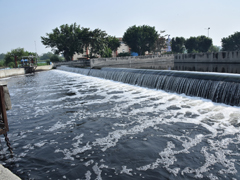
In continuation, 3 phases of Yamuna Action Plan Projects are funded by Japan International Cooperation Agency (JICA) since 1992 to augment the sewage treatment capacity by constructing and renovating Sewage Treatment Plants (STPs) and sewer lines for improved sanitary conditions of the dependent communities around water bodies. The construction of community toilet complexes also, have brought significant change in environment conservation. Recycling and reuse of this waste treated water can be used to power energy projects and other commercial establishments in and around STP locations. Currently, JICA supports 6 Yen Loan Projects and 1 Technical Cooperation Project in relation to water pollution mitigation.
Furthermore, a successful pollution abatement must also inculcate behavioural change activities. The behavioural change comprises generating awareness amongst individuals and encouraging them to imbibe hygienic activities and keep environment clean, thereby stimulating water conservation and preservation.
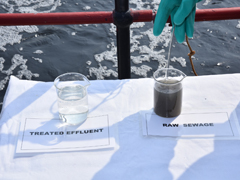
Increased urbanization has expanded vehicular traffic on city roads. A fast-developing nation like India is already home to 63 of the 100 most polluted cities in the world. In fact, Delhi is the world's most polluted capital for the fourth consecutive year, with pollution rising almost 15 per cent over the previous year [1] .
The major vehicular pollutants that define the ambient air quality are: Particulate matter, Nitrogen oxides, Carbon monoxide, Hydrocarbons and Carbon dioxide. In addition to the above pollution, un-burnt products like aldehydes, formaldehydes, acrolein, acetaldehyde and smoke are by products of vehicular emissions. To curtail the emission of these poisonous gases, transport infrastructure in the cities needs to be managed and honed effectively.
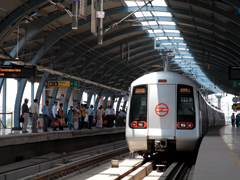
Increasing access, frequency and functioning of public transportation services alongside adding new infra such as Metros that connect people to their workplace and homes in the shortest possible time is the key to deterring pollution. Clean transport will result in clean air, which in turn will translate into clean and healthy lives. Cumulatively, JICA has extended ODA loans of over 1.6 trillion Japanese yen (approximately INR 107,505 Crore) to develop metro rail systems in Chennai, Bengaluru, Kolkata, Delhi, Mumbai and Ahmedabad. All 6 metro projects are supposed to contribute to curtail air pollution and approximately 1.6 million tons of greenhouse gas, in total, per year.
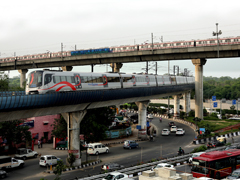
Different ecosystems act as "Ecological infrastructure" and provide diverse ecological services. For instance, forests in catchment area slow down the speed of run-off and increase water percolation, reducing flood risks in downstream area and increase availability of water in watershed. However, the increased use of natural resources including firewood and irrigation water, to meet the demands of a vast population as well as economic development including development of land for housing and development of urban areas has brought about the degradation of these vital ecosystems.
Encroaching of natural habitats has led to several injuries and fatalities among local residents following conflicts with the wildlife. For instance, in the state of Gujarat, 862 cases (including 88 fatal accidents) were reported in the five-year period between 2014 and 2018.
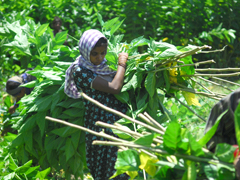
Development of forests, management of human wildlife conflict and institutional strengthening can help restore and enhance the ecosystem. Biodiversity Conservation and Greening Projects in association with local forests departments is the key to safeguard this degradation and its aftermath. Japan's support to India consists of ODA loans of 270 billion Japanese Yen (approximately INR 17,419 Crore) since 1991 towards the forestry sector. The total area of afforestation activities under JICA supported projects reaches close to 3 million hectares across Gujarat, Haryana, Himachal Pradesh, Karnataka, Tamil Nadu, Nagaland, Odisha, Sikkim, Rajasthan, Uttarakhand, West Bengal, Punjab, Uttar Pradesh, Tripura and Meghalaya.

Climatic disasters, loss of biodiversity and increasing toxic waste - the frequency of these occurrences have already sounded a blaring alarm for mankind to take note. India and Japan share a commitment towards restoring the planet through energy efficient and sustainable solutions. For instance, Japan's competence in building renewable energy systems has been aiding India's development in a sustainable and energy-efficient manner, reducing pollution from non-renewable energy sources. Several such areas of sustainable goals can help empower the nation's environment and grow the country's resilience to effectively tackle all catastrophes.
Those in the business of mitigating these hazards, need not forget the link between sustainable development and climate action. Driving investments toward cost-effective solutions and technology, with a three-pronged action plan can help make the planet a protected and better place for all organisms to survive without any long-lasting damage.
Note
[1] The Times of India, "Delhi world's most polluted capital; ranks fourth among cities, Ghaziabad 2nd," (March 23 2022), retrieved from THE TIMES OF INDIA (external link)
scroll